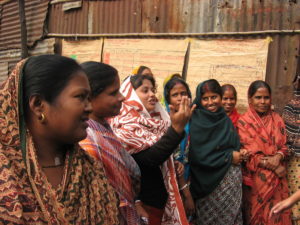The Bangladesh paradox: Why has politics performed so well for development?
Briefing No. 27 This briefing paper examines why and how political processes in Bangladesh have performed so well when the

The politics of negotiating gender equity in Bangladesh
Working paper 76 Download pdf Sohela Nazneen and Rezwan Masud In Bangladesh there is a paradox when it comes to securing
Naomi Hossain
Role Naomi Hossain is a Research Fellow at the Institute of Development Studies (IDS) at the University of Sussex, UK,
How the centralised politics of education improve access but neglect quality
8 September 2015 Researchers working on ESID's education project presented their comparative findings at the Development Studies Association meeting taking place
Video: Emerging findings on gender
30 July 2015 We recently caught up with Professor Sohela Nazneen, the Effective States gender project lead, to discuss the
High quality education for national development
28 May 2015 By David Hulme. [Reposted from Development at Manchester] Education is still considered a key strategy for reducing
Paths to development: Is there a Bangladesh surprise?
15 January 2015 [5 December 2014 original post]. By Niaz Asadullah and Antonio Savoia. Bangladesh’s economy has recorded remarkable economic
What does ESID’s new gendered political settlements framework offer feminist analysis?
7 November 2014 By Sophie King. Political settlements analysis has been largely gender blind and, as Professor Sylvia Tamale noted at a
Md. Rezwanul Haque Masud
Role Md. Rezwanul Haque Masud is a Research Assistant at the BRAC Institute of Governance and Development (BIGD), BRAC University,
Social Protection: The August 2014 issue of SANEM Thinking Aloud
4 August 2014. By Selim Raihan. ESID partner SANEM (South Asian Network on Economic Modeling) has just published the August, 2014 issue
Regional integration in South Asia: New issue of SANEM Thinking Aloud
15 July 2014. The South Asia Network of Economic Modelling (SANEM) has just released the second issue of its monthly
Dr Deepta Chopra
Role Deepta Chopra is a Research Fellow at the Institute of Development Studies (IDS). She is involved with ESID on
Thinking Aloud – News from SANEM
9 June 2014. by Selim Raihan. ESID partners, SANEM (South Asian Network on Economic Modeling) have launched a new monthly
Dr Selim Raihan
Role Dr Selim Raihan is Professor at the Department of Economics, University of Dhaka and Executive Director at the South
Dr Mirza Hassan
Role Mirza Hassan is a political economist currently working as a Lead Researcher based at the BRAC Institute of Governance
Can aid bureaucracies think politically? The administrative challenges of political economy analysis in DFID and the World Bank
Working paper 33 Download pdf Pablo Yanguas and David Hulme Abstract Although politics has become central to international development assistance,
Professor Sohela Nazneen
Role Sohela Nazneen is a Research Fellow in Gender and Sexuality at the Institute of Development Studies (IDS) (Sussex, UK), and
Guest post: How "poor" economics informs the political culture of Bangladesh
26 March 2014. By Binayak Sen. Bangladesh's experience of the last two decades suggests that decent long-term economic development can
Dr Pablo Yanguas
Role Pablo Yanguas is Research Fellow at the Effective States and Inclusive Development (ESID) research centre, where he leads research
The political economy determinants of economic growth
Objective This project aims to contribute to the literature on the political determinants of growth in three ways: Attempting to
Gender and the political settlement
Objective This research project aims to investigate the relationship between women’s [political] inclusion and their ability to deliver gender-inclusive development,
Professor David Hulme
Role David Hulme is CEO at ESID. He is also Professor of Development Studies and Executive Director of the Global

